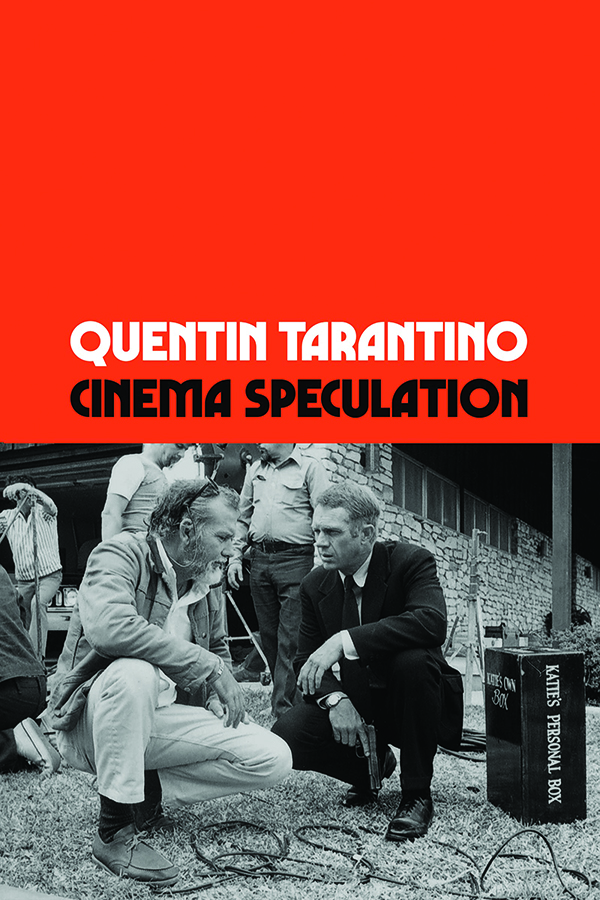
Quentin Tarantino takes on the movies
Daniel Ross Goodman
Quentin Tarantino needs no introduction. Everyone knows about Pulp Fiction, Kill Bill, Inglourious Basterds, and all the rest. What everyone might not know is that Tarantino has also recently become a force in the world of books. His novelization of his 2019 movie, Once Upon a Time in Hollywood, was a No. 1 New York Times bestseller in 2021. Tarantino has now set his sights on creative nonfiction. Cinema Speculation, his first nonfiction book, is an entertaining, insightful, and — this being Tarantino — unfailingly obscene journey through some of the films and filmmakers that have most stimulated the mind of one of the most consistently entertaining filmmakers of our time.

Tarantino’s tastes are certainly a bit eccentric, if not downright psychologically disturbing, in their devotion to the aestheticization of violence. As he writes in Cinema Speculation, he believes that The Texas Chainsaw Massacre is “one of the few perfect movies ever made.” But his aim with this book isn’t to change his readers’ movie preferences. It’s that they might “learn a little something about cinema.” Judging it by these terms, anyone who reads Cinema Speculation will surely learn a lot more about cinema, especially violent cinema, than they had known before.
Tarantino packs the book with apercus and opinions about a wide array of movie topics. Among many compelling, innovative interpretations of other directors’ movies as well as his own, we hear why Steve McQueen was able to do better movies in the ’60s than Paul Newman and Warren Beatty, why ’80s movies were even worse than ’50s movies, and the difference between Alfred Hitchcock’s and Roman Polanski’s movies. In all this, his irrepressible love of cinema comes gushing out like water from a burst dam. These effusive torrents come pouring out with gobs of obscenities. Rolling Thunder “blew my f-ing mind!” The violent and gory Wild Bunch also “blew [his] f-ing mind.” The Godfather, Dirty Harry, The French Connection, and Bullitt were “f-ing amazing!” And Sunday Bloody Sunday, Isadora, The Fox, and Goodbye, Columbus were “f-ing boring.” The synopsis of Joe “can’t begin to convey how f-ing funny the film is.” Incessant streams of obscenities may sound funny when they’re coming out of the mouth of Samuel L. Jackson or Harvey Keitel, but after reading 20 pages in which the F-word is the most frequent adverb on the page, it starts to get a bit tiresome. That said, I have to admit that I did laugh when he described the 1970 Robert Altman film Brewster McCloud as “the cinematic equivalent of a bird s***ting on your head.”
Tarantino also has a strange habit of italicizing far too many words in his sentences — “I thought those movies were incredible,” “A relatively old-fashioned [film],” “A guy in a gorilla suit getting punched in the nuts was the absolute pinnacle of comedy,” “In that moment the concept of satire was explained to me,” “If you’re more of the mind that it is your intellect and your consciousness that make you who you are, then the Pod People transformation is closer to a rebirth than a murder” — It’s almost as if Tarantino has not realized that he is supposed to be writing prose here instead of a screenplay in which he gives his actors precise directions about which words to emphasize in their deliveries. Tarantino, who has won two Oscars for his screenwriting, won’t be winning any Pulitzers for his book writing anytime soon.
But let’s be honest: The reason we’re going to be reading this book isn’t because it has beautiful Bellovian sentences. We’re going to read it because it’s a book about movies that was written by Quentin Tarantino. What movie lover would not want to know what one of the greatest filmmakers of this generation thinks about, for instance, Robert De Niro’s performance in Taxi Driver? Or his views on the post-’60s anti-establishment auteurs (Robert Altman, Arthur Penn, William Friedkin, et al.) vs. the so-called movie brats (Scorsese, Spielberg, George Lucas, et al.) of the ’70s? But what is most significant about this book for both movie lovers and film historians is what Tarantino tells us about himself: fascinating tidbits about things like the movie he saw growing up that changed his life or the director we may not have expected that changed his approach to filmmaking. (Hint: His muse is Penelope Cruz.)
Tarantino tells us about how he developed his love of movies in the first place. It was his parents, we learn in Cinema Speculation, who gave him his start in cinephilia, taking him early and often to movies no matter the genre and no matter how “adult” the subject matter may have been. His parents took him to see Carnal Knowledge when he was only 9 years old. (Cue the Steve Coogan-Rob Brydon Michael Caine imitation from The Trip: “He was only nine years old!“) And when he was even younger than that, they took him to see other not-exactly-G-rated movies like Dirty Harry, The Godfather, and the Dollars Trilogy. The only movie he saw as a child that actually scarred him was Bambi — though, in his (probably correct) opinion, he’s not alone in that respect: “Those sequences in Bambi have been f-ing up children for decades. … Nothing prepared me for the harrowing turn of events [in the movie]. I remember my little brain screaming the five-year-old version of What the f-‘s happening?”
Tarantino theorizes that he became a more sophisticated film viewer because his parents didn’t try to hide him from challenging movies. On the contrary, they actively exposed him to them. As he recounts, when he asked his mother why she let him watch the kinds of movies his classmates weren’t allowed to see, she replied, “Quentin, I worry more about you watching the news. A movie’s not going to hurt you,” to which he responds here, “Right f-ing on, Connie!” For Quentin’s mother, it was less important that he be protected from violent images than that he understand the context of why the violence was occurring. The only thing she objected to, according to him, was exposing him to violence for violence’s sake. As to whether or not Tarantino hasn’t been guilty of doing just that to his audiences for the past 30 years, well … I’ll let you movie lovers be the judge of that.
Daniel Ross Goodman is a Washington Examiner contributing writer and the author, most recently, of Somewhere Over the Rainbow: Wonder and Religion in American Cinema.
